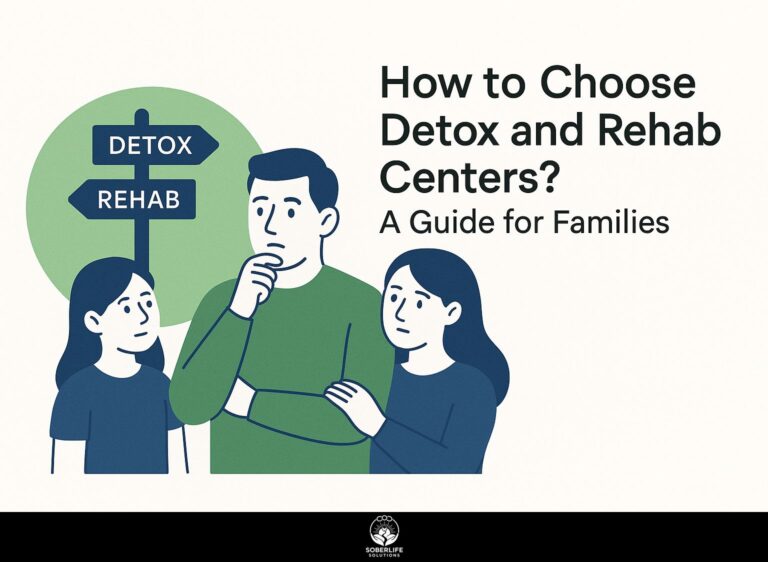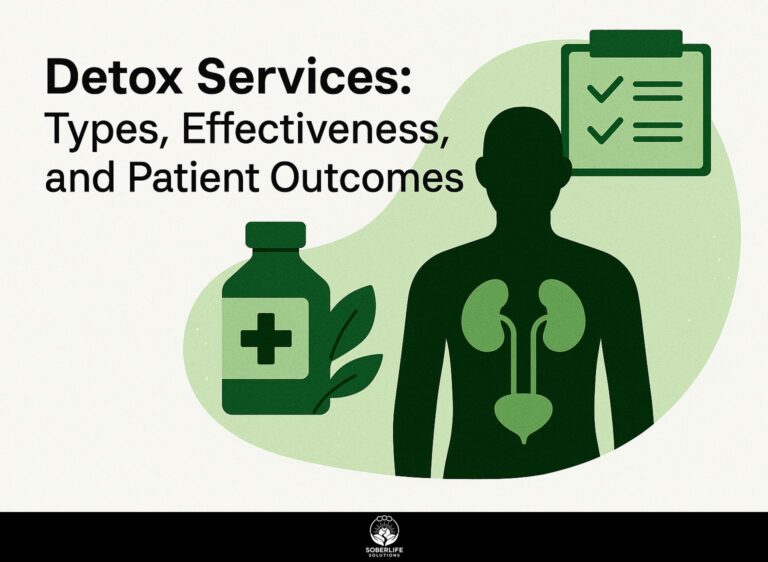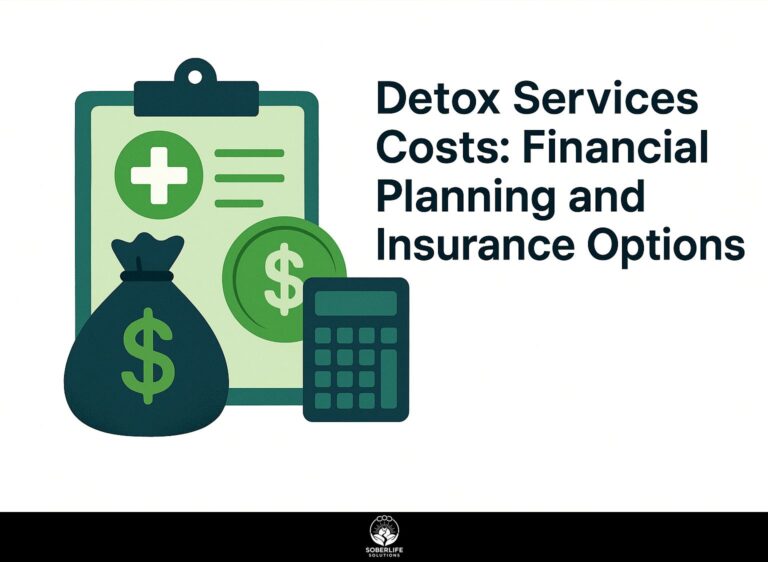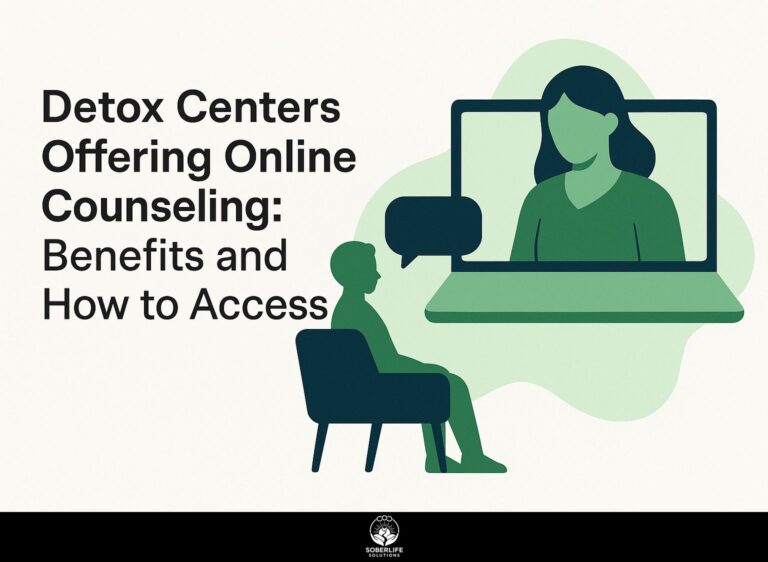Detox Centers: Prenatal Care, Childcare Services, and Aftercare
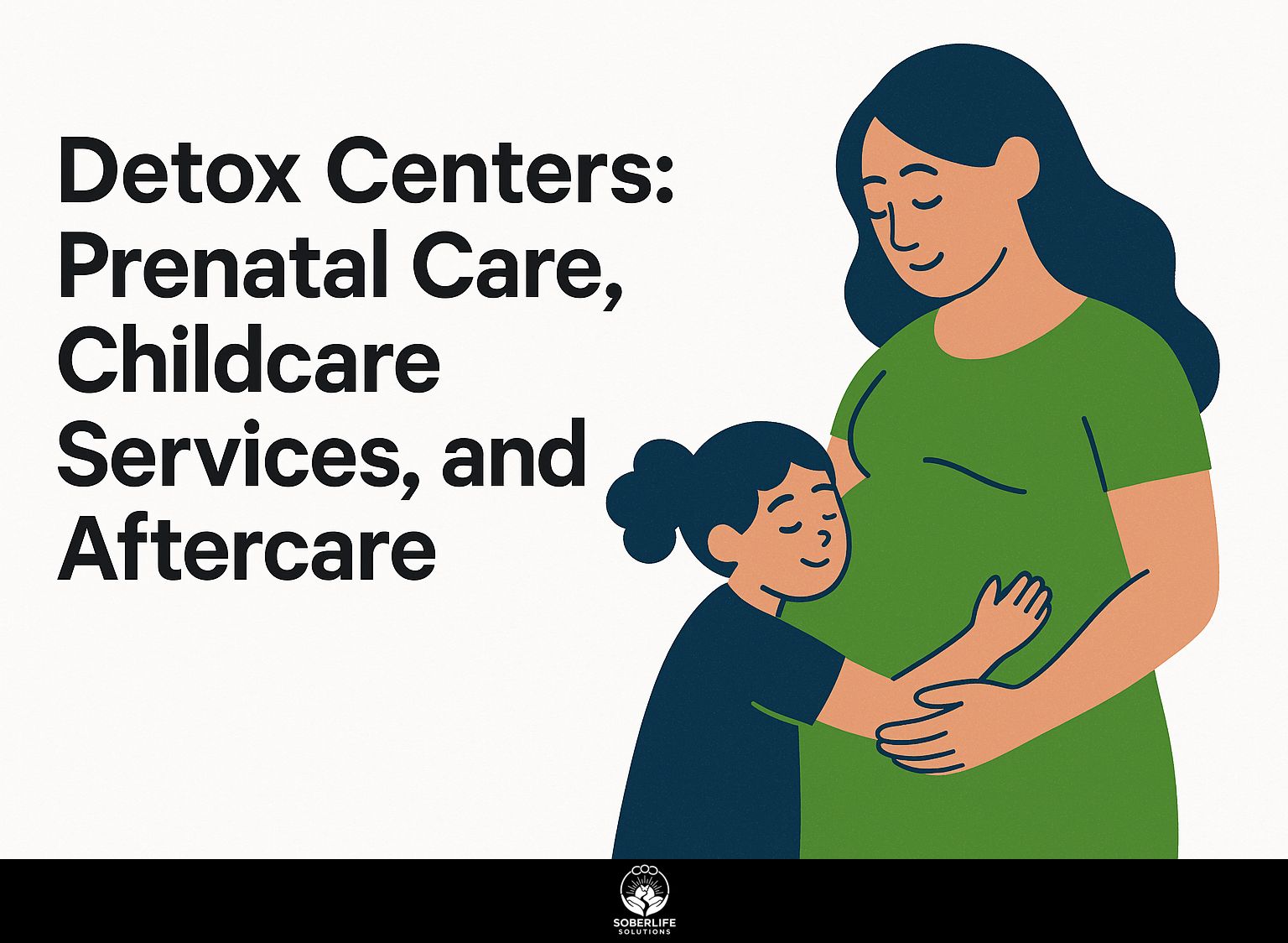
Introduction to Detox Centers
Finding the way to overcome substance use can be challenging, especially for pregnant women. Detox centers are important in this process, providing specific treatment choices such as live-in care and programs where patients visit during the day, customized to each person’s needs. Websites like FindTreatment.gov offer important details about treatment for alcohol addiction and substance use disorders. In this article, we will discuss why prenatal care, childcare services, and aftercare programs are important for long-term recovery for both parents and their children.
Key Takeaways:
Importance of Prenatal Care in Detox
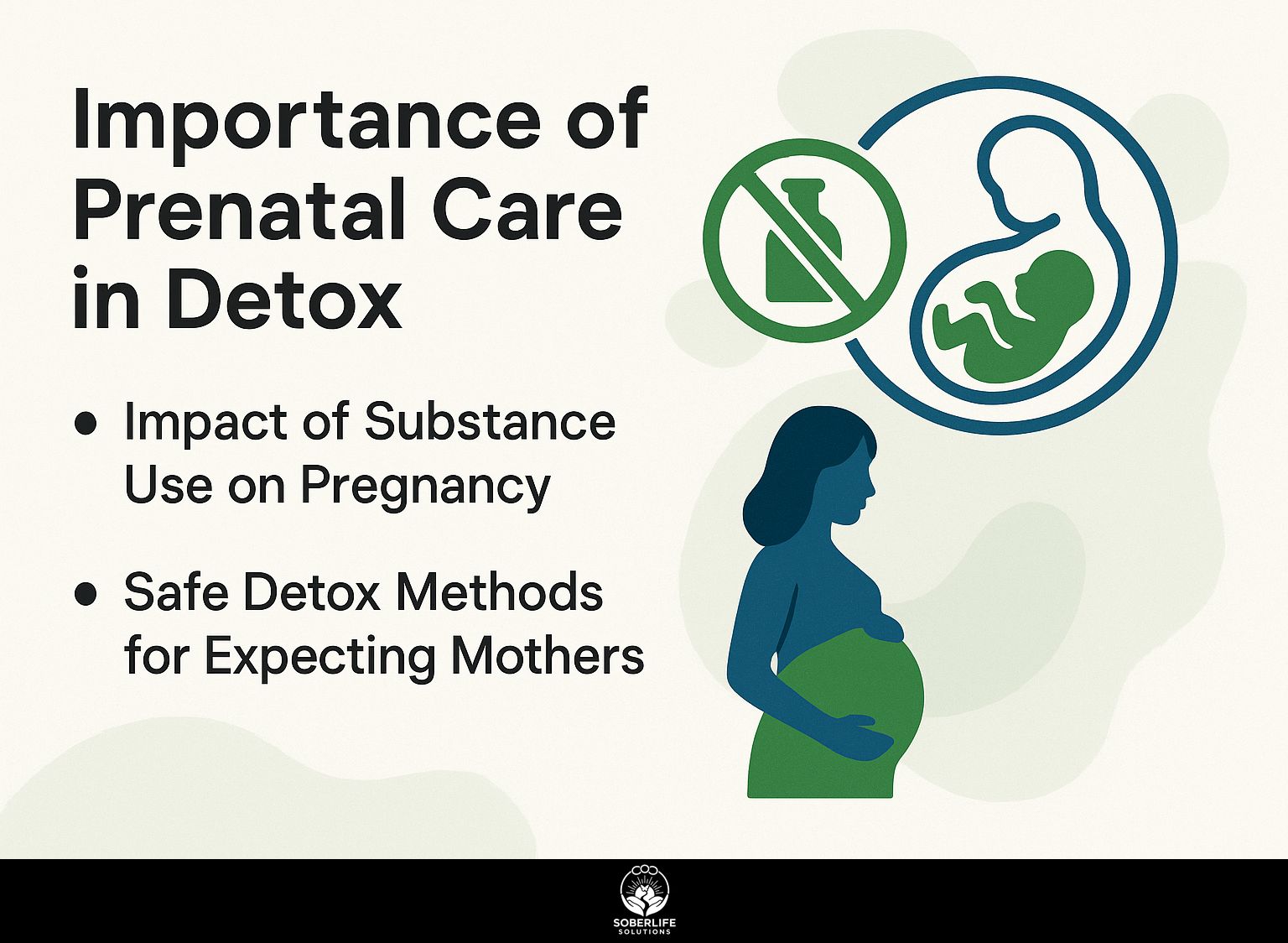
Prenatal care is very important for pregnant women going through detox because using drugs or alcohol can greatly harm both the mother and baby.
Impact of Substance Use on Pregnancy
Substance use during pregnancy can lead to serious complications, such as low birth weight, preterm labor, and developmental disorders, necessitating specialized treatment approaches.
Early intervention is crucial. Prenatal screenings should include assessments for substance use, which can identify at-risk pregnancies.
For instance, healthcare providers can use urine toxicology screenings as a reliable method, with studies showing that they can detect substances like cannabis and opioids effectively.
Implementing counseling programs, such as the CenteringPregnancy model, provides an environment for education and support. This kind of program has been linked to improved outcomes, helping reduce risks associated with substance use.
Tailoring treatments based on individual needs is essential for maternal and fetal health.
Safe Detox Methods for Expecting Mothers
Safe ways for pregnant women to detox include detoxing under medical supervision and having treatment plans designed for their specific needs to protect both the mother and the baby.
Programs like Methadone Maintenance Treatment (MMT) provide a structured approach by offering methadone, a long-acting opioid agonist that helps manage withdrawal symptoms without the high associated with other opioids. This aligns with findings from the American College of Obstetricians and Gynecologists (ACOG), which discusses managing opioid use disorder during pregnancy.
The Maternal Wrap Around Program is another excellent example, integrating prenatal care with substance use treatment. This program connects mothers to essential resources, including counseling and medical support, promoting a healthier pregnancy.
These methods concentrate on complete care, ensuring safety and health, and providing a nurturing setting for both mother and baby.
Childcare Services in Detox Centers
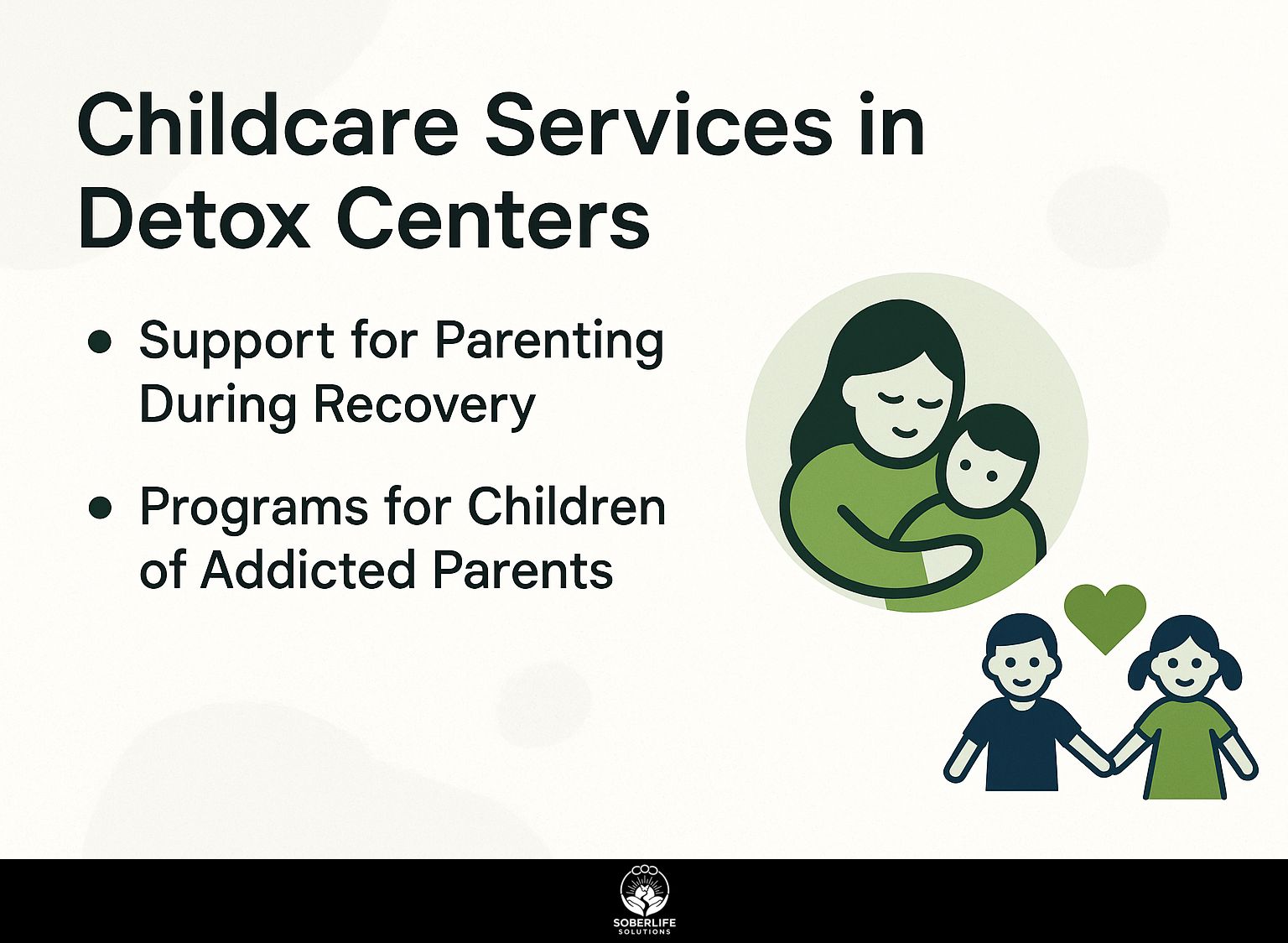
Childcare services at detox centers give important help to parents, allowing them to keep custody of their children and strengthen family ties during recovery. For those seeking additional support, participating in groups like the Friendship Group Last Sunday Evening Birthday AA Meeting can enhance the recovery process.
Support for Parenting During Recovery
Programs designed specifically for parenting individuals in recovery, such as family counseling and parenting education, can significantly improve parenting skills and recovery outcomes.
For example, JSAS Healthcare provides one-on-one counseling sessions specifically designed to address parenting issues encountered by individuals in recovery. Their group counseling options help parents find support from each other, letting them share experiences and strategies.
Teaching parents as a whole gives them tools like positive feedback and clear communication, improving how they raise their kids. Joining these programs helps parents improve their recovery and build a better family environment, benefiting their own growth and their children’s development.
Programs for Children of Addicted Parents
Programs designed to help children of parents who struggle with addiction, like childcare support and educational outreach, are essential for keeping families together during recovery.
Initiatives like those from the Southern New Jersey Perinatal Cooperative provide specialized counseling and developmental services for these children. Research indicates that children participating in such programs show a 30% improvement in emotional and behavioral development, a finding supported by SAMHSA.
The Cooperative provides parenting classes and support groups, so parents get help. Signing kids up for local activities that teach social skills and resilience can greatly increase their confidence and ability to handle challenges. Learn more about the importance and access of family peer support to further understand its critical role.
These methods are key in breaking the cycle of addiction.
Aftercare Programs Post-Detox
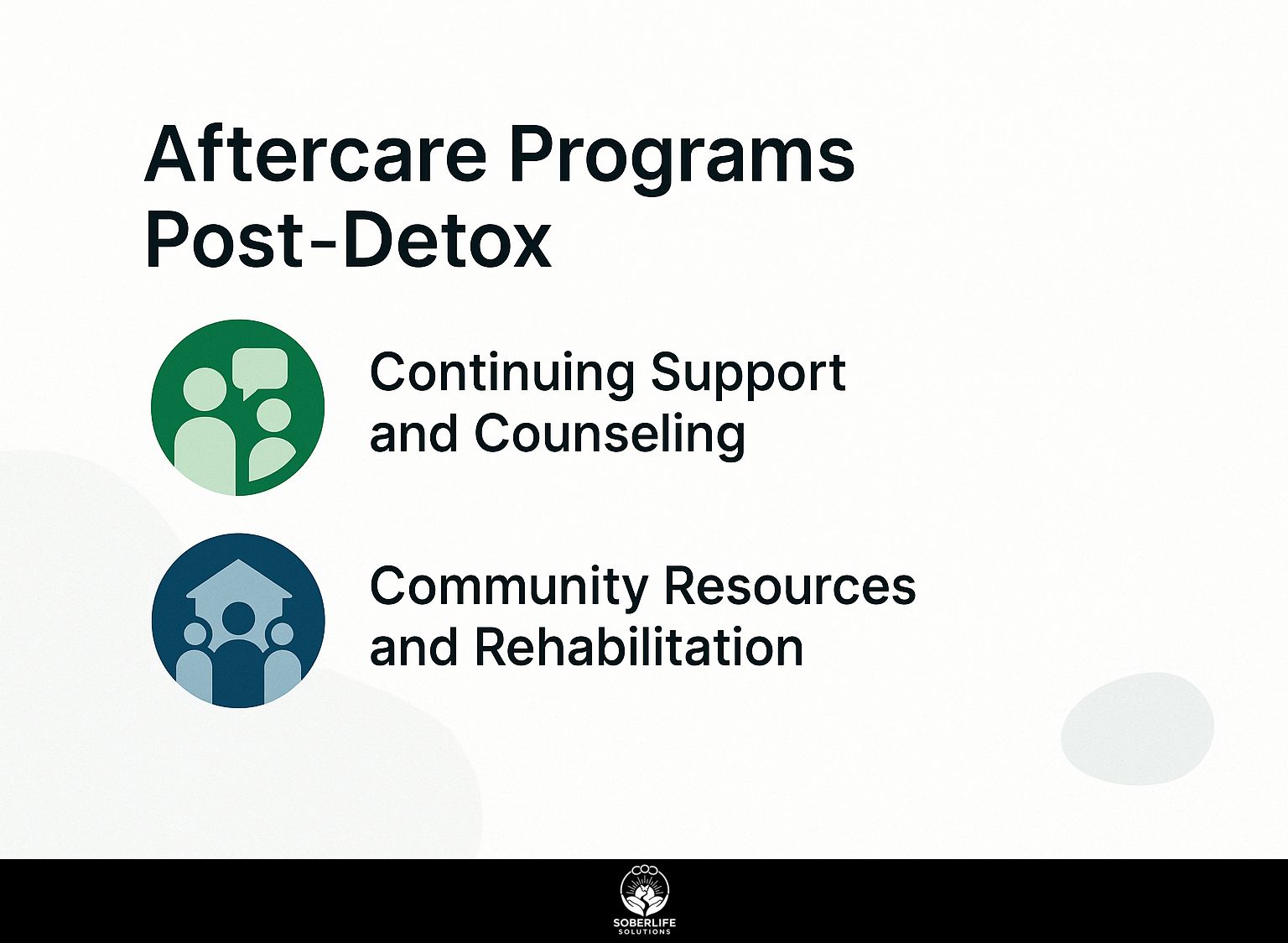
Aftercare programs are essential for continuing recovery after detox. They offer ongoing counseling and community resources designed for each person’s needs. For those looking to extend their recovery efforts, exploring strategies to prevent alcohol relapse can be particularly beneficial, ensuring sustained sobriety.
Continuing Support and Counseling
One-on-one counseling sessions, like those offered by community treatment services, have been shown to significantly improve recovery results.
These sessions often include one-on-one therapy, where counselors use methods like Cognitive Behavioral Therapy (CBT) or Motivational Interviewing to tackle specific problems. For example, individuals who engage in regular sessions may see a 30% increase in relapse prevention rates. In fact, a study published by ScienceDirect highlights the significant impact of counseling participation on treatment effectiveness, underscoring the importance of consistent therapy.
Group counseling offers community support, allowing people to share experiences that create strong connections and increase responsibility.
Family counseling repairs relationships and improves communication, making it easier to stay in recovery.
Successful cases often report reduced stress and a 25% decrease in substance use when consistent counseling is maintained.
Community Resources and Rehabilitation
Community resources, like programs to prepare for jobs and transport services, are very important in helping people recover after detox.
Organizations like Zufall Health Center offer health care and important job coaching services designed for people in recovery. Their programs often include mock interviews and resume building, helping individuals present their best selves to potential employers.
Local community colleges often provide workshops that teach skills like using computers and vocational training, helping participants gain hands-on experience.
Another helpful option could be local nonprofits that offer free rides to job interviews and training sessions, helping people overcome obstacles that might hold them back.
Case Studies and Success Stories
Real-world examples demonstrate how combined detox and recovery programs successfully change lives and stop addiction.
For example, Serenity Hill Detox uses a thorough method, combining traditional therapy with mindfulness techniques, leading to a 75% retention rate. Their program emphasizes individualized care and family involvement.
Similarly, Rising Hope Center focuses on dual diagnosis, addressing substance use and mental health simultaneously. Their success rate shows a notable improvement in long-term recovery, with over 70% of clients maintaining sobriety after one year.
These centers highlight the need for customized treatment for lasting success, showing a shift toward complete recovery plans.
Frequently Asked Questions
1. What is the importance of prenatal care at detox centers?
It is important for pregnant women with substance abuse issues to receive prenatal care at detox centers. It helps keep pregnancy safe and healthy, lowers the risk of problems, and improves the likelihood of having a healthy baby.
2. Do detox centers provide childcare services for mothers in treatment?
Yes, many detox centers offer childcare services for mothers in treatment. These services allow mothers to focus on their recovery while also providing a safe and nurturing environment for their children.
3. What type of aftercare support is available at detox centers?
Detox centers typically offer a variety of aftercare support, including therapy, support groups, and relapse prevention strategies. These services are designed to help individuals maintain their sobriety and successfully transition back into their daily lives.
4. Are there specialized detox centers for pregnant women?
Yes, there are specialized detox centers that cater specifically to pregnant women. These centers have doctors and nurses with experience in handling drug problems during pregnancy. They provide specific care to keep both the mother and baby safe and healthy.
5. Can a pregnant woman safely detox from drugs or alcohol?
It is not recommended for pregnant women to detox from drugs or alcohol without medical supervision. Detoxing can be dangerous for both the mother and baby, and it is important to have proper medical care and support during the process.
6. How can I find a detox center that offers prenatal care and childcare services?
You can research detox centers in your area or consult with a medical professional for recommendations. It is important to find a center that meets your specific needs and offers the necessary services for a successful recovery.

